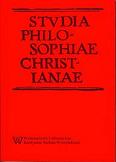Unintended Morally Determinative Aspects (UMDAs): Moral absolutes, moral acts and physical features in reproductive and sexual ethics
Unintended Morally Determinative Aspects (UMDAs): Moral absolutes, moral acts and physical features in reproductive and sexual ethics
Author(s): Anthony McCarthySubject(s): Philosophy, Ethics / Practical Philosophy
Published by: Wydawnictwo Naukowe Uniwersytetu Kardynała Stefana Wyszyńskiego w Warszawie
Keywords: Unintended Morally Determinative Aspects; intention; moral act; exceptionless moral norms; natural law
Summary/Abstract: Catholic sexual ethics proposes a number of exceptionless moral norms. This distinguishes it from theories which deny the possibility of any exceptionless moral norms (e.g. the proportionalist approach proposed in the aftermath of "Humanae Vitae" and condemned in "Veritatis Splendor"). I argue that Catholic teaching on sexual ethics refers to chosen physical structures in such a way as to make ‘new natural law’ theory inherently unstable. I outline a theory of “the moral act” (Veritatis Splendor 78) which emphasises the place which chosen physical features – in particular, chosen sexual structures – play in specifying human actions. I conclude that this account, involving what I term UMDAs, is needed to make sense of the Church’s teaching in these areas.
Journal: Studia Philosophiae Christianae
- Issue Year: 51/2015
- Issue No: 2
- Page Range: 143-158
- Page Count: 16
- Language: English

